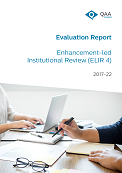The Enhancement-led Institutional Review (ELIR) method was an enhancement-led evidence-based peer review carried out by QAA Scotland at Scottish higher education institutions. The ELIR method resulted in a judgement and a set of commendations and recommendations relating to the way the institution secured academic standards and improved the quality of the student experience.
The fourth cycle of the ELIR 4 method, which placed much greater emphasis on contextualising the review than previous versions of the method, ran from 2017-22. Full information can be found in the Handbook.
Pressing Escape will cancel and close this dialog
Compliance with the ESG
The Standards and Guidelines for Quality Assurance in the European Higher Education Area (ESG) provide the framework for internal and external quality assurance in the European Higher Education Area. QAA’s review methods are compliant with these standards, as are the reports we publish. More information is available on our website.
Enhancement-led Institutional Review handbook (fourth edition)
Publication date: 12 Apr 2017
Reports and outcomes
At the end of each review visit, the ELIR team produced an Outcome Report, which set out the threshold judgement, the differentiated commendations and recommendations, and outline information about the institution. They also produced a more detailed Technical Report, containing the detailed findings from the review and written primarily for the institution reviewed.
While we contextualised ELIR reports to the main themes of the review, as established by the review team in conjunction with the institution under review, we structured all Technical Reports to cover five broad areas of institutional activity:
- contextual information about the institution, student population and the review
- approach to enhancing the student learning experience
- strategy and practice for enhancing learning and teaching
- academic standards and quality processes
- collaborative provision.
We also produced Thematic Reports to highlight the findings from a number of ELIRs carried out at different institutions. The Technical Reports provided an evidence base for these Thematic Reports.
Evaluation
We undertook a comprehensive evaluation of the ELIR 4 review cycle. This report provides information on the evaluation methodology, key findings and recommendations.
Evaluation Report: Enhancement-led Institutional Review (ELIR 4), 2017-22
Publication date: 19 Jan 2022
Knowledge base
We produced an ELIR 4 Knowledge Base that includes the content of all 18 Technical Reports published between 2018-22. This Knowledge Base is an Excel spreadsheet and can be used by filtering, searching or using the summary table.
This helpful resource allows users to interrogate rich information from reviews of Scottish institutions, and to identify areas of good practice across a wide range of themes.
ELIR 4 Knowledge Base
Publication date: 28 Apr 2022
Key reference points
The ELIR method drew on a range of reference points. Some are UK-wide, such as the UK Quality Code for Higher Education, and others are specific to Scotland, for example the Enhancement Themes or outcomes of Focus On projects. Other reference points were specific to the individual institution and were agreed on a case-by-case basis.

